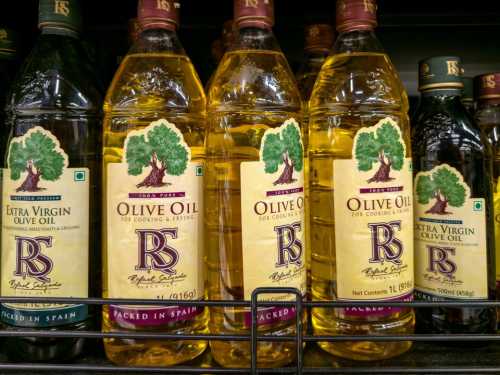
Vegetable oil is one of the most common products in any kitchen. However, there are many myths and contradictory advice surrounding it. Does frying in oil really produce carcinogens? Which one should you choose for salad and which one for frying? Should you be afraid of sediment in the bottle and is olive oil really the absolute champion in terms of benefits?
In this article, we will look at the most popular claims about oil and find out where the truth lies and where the common misconceptions lie.
Myth 1. Carcinogens are formed in oil during frying
This statement depends on the type of oil. The key factor is the “smoke point” — the temperature at which the oil begins to smoke, break down, and produce harmful substances, including carcinogens.
Unrefined oils (Extra Virgin olive oil, cold-pressed sunflower oil, linseed oil) have a low smoke point (160-190°C). They are not intended for frying at high temperatures, as they will start to burn at 180°C. They are better used for dressing salads or dishes that do not require high heat.
Refined oils (sunflower, rapeseed, corn) have a high smoke point (220-240°C). They are suitable for frying. It is difficult to achieve temperatures in the home kitchen at which even these oils form a significant amount of carcinogens.
So, the rule is simple: for salads – unrefined, for frying – refined.
Myth 2. If there is a cloudy sediment in a bottle of unrefined oil, it is better not to use it.
The sediment that remains in unrefined, non-deodorized, non-frozen oil is protein, waxes, and sunflower seed shells that have gotten into the oil from the raw material. You can filter them out and leave the oil to settle. But there is nothing dangerous or harmful in this sediment.
Myth 3. There are no vitamins in oil, only fat
Vegetable oils are a source of a large number of biologically active substances, primarily unsaturated and polyunsaturated fatty acids. For example, for sunflower oil, these are mainly omega-6 polyunsaturated acids (up to 70%) – they are useful for the prevention of cardiovascular diseases, as well as for the health of the skin and nervous system. Linseed oil contains omega-3 polyunsaturated fatty acids, which are also very important in human nutrition. The balance of omega-3 and omega-6 content is also important. Vegetable oils are a source of the natural plant antioxidant tocopherol (vitamin E). By the way, tocopherols extracted from oil are sometimes used as food additives E306 and E307.
Myth 4. Vegetable oil raises cholesterol
In fact, it's the opposite. Vegetable oil contains phytosterols, which are to some extent competitors of cholesterol. Therefore, phytosterols are actively used in diets when it is necessary to reduce cholesterol intake. So if you want to reduce the risk of cardiovascular diseases – strokes, heart attacks and others, consume more liquid oils and less solid fats. This is a recommendation from the World Health Organization since 2005.
While it is understood that the oil itself does not directly raise cholesterol, some tropical oils (coconut, palm) contain a high percentage of saturated fat. Excessive consumption of saturated fat, regardless of the source, can contribute to elevated cholesterol levels.
Myth 5. The healthiest oil is olive oil
The benefits of olive oil (especially Extra Virgin) are scientifically proven, but the idea that there is one “best” oil is a myth. Each oil has its own unique composition and benefits. The value of olive oil lies in its high content of monounsaturated oleic acid (omega-9) and unique antioxidants – polyphenols, which have a powerful anti-inflammatory effect. At the same time, it contains relatively little polyunsaturated omega-3 and omega-6 acids, which are rich in other oils.
You can get more benefits and pleasure by combining different types of oils. The ideal strategy is not to look for one best, but to create balanced mixtures. For example, sunflower oil is rich in omega-6. If you add flaxseed or safflower oil, which are rich in omega-3, to it, the mixture will become much more valuable for health. You can also add a little pumpkin seed oil (preferably omega-6), which will add a nutty flavor. Unusual oils are expensive, but you need to add a little, buy them in small packages and it is better to store them in the refrigerator.
Myth 6. It is better to buy oil in large packages to save money
If we are not going to use a large amount of oil at once, for example, for home cooking, then when buying oil in a store, it is best to choose a smaller package. The fact is that the longer the oil in an open bottle is in contact with air, the more it oxidizes. Oil in a smaller bottle can be used faster, and it will be in contact with air and oxidized less.
But in general, you should just focus on your own taste.
Myth 7. Oil does not spoil during storage
It is not recommended to keep the oil in the light. Because in this case it heats up and oxidizes faster. It is better to store an open bottle in a cool place. The higher the temperature, the higher the rate of oxidation. Therefore, if we use it slowly, it is better to put an open bottle of oil in the refrigerator.
It is worth noting that some oils (for example, Extra Virgin olive oil) may thicken and become cloudy when stored in the refrigerator. This is a normal process that does not affect the quality. At room temperature, the oil will become clear again.





